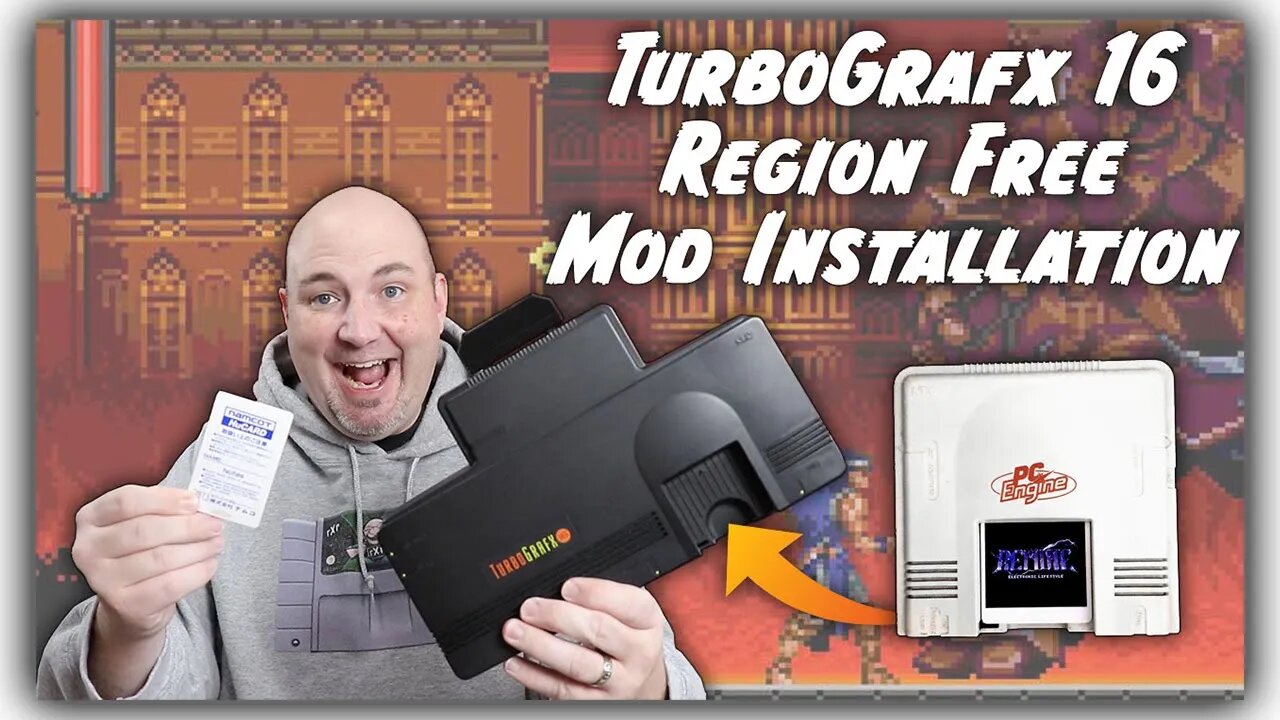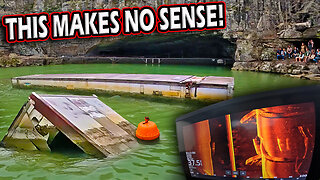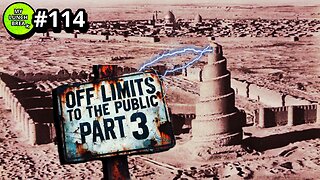Premium Only Content

Play PC Engine Games on a TurboGrafx 16: Region-Free Mod Installation
In this episode, I walk you through the steps I took to install a region free mod kit into my Turbografx 16.
Hello, my name is Gary, and I cannot leave a retro console un-modded. Whew, that's a weight off of my shoulders. It is true, most of my retro video game systems have some sort of modification installed. I've installed RGB mod kits into Nintendo 64s and Super NES Jrs, I've HDMI modded my NES, and my Model 2 Genesis has a mod installed in it as well. It was only a matter of time that I turned my attention to my Turbografx 16.
The Turbografx 16 uses the same size and shape HuCards as its cousin, the PC engine. The nice thing about Japanese and American systems is the fact that they are both NTSC and can use each other's games, theoretically. The TG16 has a region lockout at a system level, but thankfully Jason at Game-Tech.US has a super simple and budget friendly board you can install to bypass this. For about $25, you received a small PCB, a length of three conductor wire, and a switch. I have ordered other kits from Jason in the past, and always been very happy with the overall fit, finish, and design.
While getting into the system only requires a 4.3 mm security bit, there are two RF Shields you must remove. There's a few ways you can do this, you can use an Xacto knife and try to pop them off the board, you can take a Dremel tool and try to cut them off the board, or you can take a soldering iron and desolder them from the board. I opted for the third option here, and after about 5 minutes of desoldering, I had both RF Shields removed.
Jason designed the board so that it lays perfectly over the pins you'll need to solder to. One step you will want to make sure that you take, and unfortunately my SD card was corrupted during the capture of this footage, is to take a small pin, needle, or leg off of a resistor to drive the solder through the holes on the board to make contact with the pads down below. I thought I had done this efficiently the first time, but when I tested it out I was not getting any signal. I went through and hit it a second time, and it worked without a problem.
The most agonizing part of this mod for me was cutting the traces on the bottom of the board. See, Jason's board bypasses and changes how the signal works coming out of the system. To do this you have to interrupt the circuits that was originally on the board. I was worried about damaging my system and screwing it up thankfully that was not the case.
The final step was installing the slide switch into the case itself. I wanted to mount it permanently and did not want to use hot glue. Dubro RC makes 2/56 Allen had screws and nuts that I was able to utilize to hold the switch into the case. I do wish that I had a button head screw instead, but I may go back and update that later on.
Getting the system back together and turning it on, I was thrilled that it worked perfectly. Japanese PC Engine games can be significantly less expensive than their American TG16 counterparts. This copy of Pacland here, for example, I scored for about 20 bucks complete in box. The US version ranges from $30 to $50. Plus, there are games they got in Japan that we never saw here in the US, which makes me even more excited for future potential.
Again, huge props to Jason at game tech us for creating an amazing kit that is simple to install and simply works. And for $25? Get out of town! Also, thanks to Voultar for pointing me in Jason's direction for a solution that is easy and effective to install. Now, I need to go get some PC Engine games!
#TurboGrafx16 #PCEngine #RegionMod #PacLand #BonksAdventure
The footage used in this review are used under the Fair Use laws, referenced below:
https://www.law.cornell.edu/uscode/text/17/107
Notwithstanding the provisions of sections 106 and 106A, the fair use of a copyrighted work, including such use by reproduction in copies or phonorecords or by any other means specified by that section, for purposes such as criticism, comment, news reporting, teaching (including multiple copies for classroom use), scholarship, or research, is not an infringement of copyright. In determining whether the use made of a work in any particular case is a fair use the factors to be considered shall include—
(1) the purpose and character of the use, including whether such use is of a commercial nature or is for nonprofit educational purposes;
(2) the nature of the copyrighted work;
(3) the amount and substantiality of the portion used in relation to the copyrighted work as a whole; and
(4) the effect of the use upon the potential market for or value of the copyrighted work.
The fact that a work is unpublished shall not itself bar a finding of fair use if such finding is made upon consideration of all the above factors.
(Pub. L. 94–553, title I, § 101, Oct. 19, 1976, 90 Stat. 2546; Pub. L. 101–650, title VI, § 607, Dec. 1, 1990, 104 Stat. 5132; Pub. L. 102–492, Oct. 24, 1992, 106 Stat. 3145.)
-
 19:59
19:59
RoXolidProductions
11 months ago $0.04 earnedPlay Japanese Super Famicom Games On US Super Nintendo!! NEStoration™ Region Free Mod Kit
3322 -
 34:27
34:27
The Connect: With Johnny Mitchell
12 hours ago $5.73 earnedCan He Stop Them? Inside Trumps War On Mexican Drug Cartels & The New Era Of Mexican Organized Crime
13.5K2 -
 2:33:15
2:33:15
Tundra Tactical
4 hours ago $4.68 earnedLuis Valdes Of GOA Joins The Worlds Okayest Firearms Live Stream!!!
14.9K -
 1:03:41
1:03:41
Man in America
13 hours agoAre Trump & Musk the COUNTER-ELITES? w/ Derrick Broze
43.6K28 -
 3:45:08
3:45:08
DLDAfterDark
4 hours ago $5.67 earnedDLD Live! SHTF Handguns! Which Would You Choose?
24.4K1 -
 1:50:38
1:50:38
Mally_Mouse
6 hours agoSaturday Shenanigans!! - Let's Play: Mario Party Jamboree
36.2K -
 1:13:00
1:13:00
Patriots With Grit
10 hours agoWill Americans Rise Up? | Jeff Calhoun
29.1K10 -
 14:55
14:55
Exploring With Nug
11 hours ago $9.92 earnedWe Found Semi Truck Containers While Searching for Missing Man!
47.6K7 -
 27:57
27:57
MYLUNCHBREAK CHANNEL PAGE
18 hours agoOff Limits to the Public - Pt 3
98K62 -
 38:07
38:07
Michael Franzese
11 hours agoLeaving Organized Crime and Uncovering Mob in Politics: Tudor Dixon and Michael Franzese
85.5K15